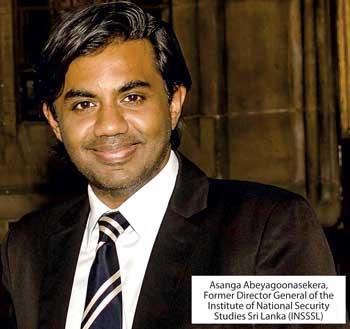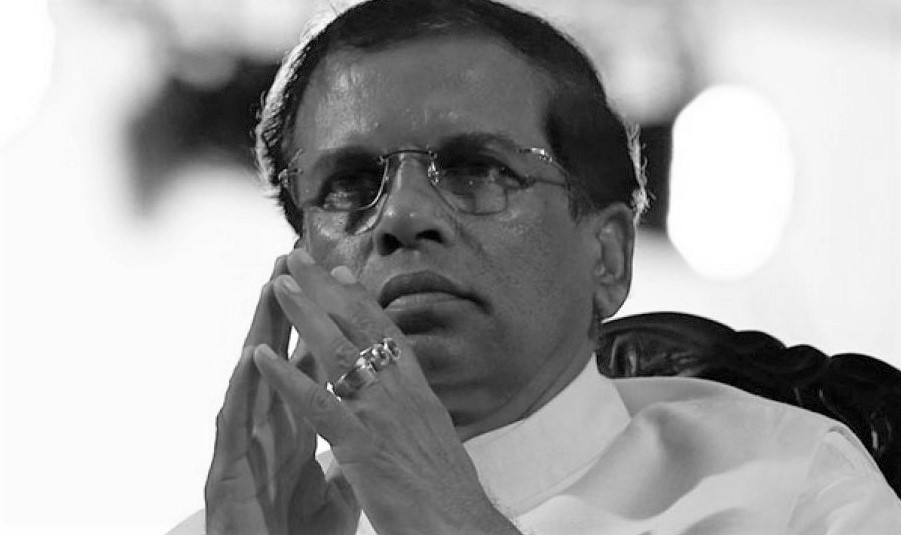Three confidential reports produced by the Institute of National Security Studies Sri Lanka (INSSSL) ” and given to the president Sirisena on extremists threats in Sri Lanka have been ignored, says former INSSSL Director General Asanga Abeyagoonasekera.
Experts from an interview with Asanga Abeyagoonasekera.
In 2016 I was invited by President Maithripala Sirisena to become the Director General of INSSSL. And so, I took the position and the challenge as the founding Director General to start the institute.
 We had strong links with other security think tanks. Back then when I was at the Kadirgamar Institute, we had created 13 MOUs with other security think tanks, as well as foreign policy think tanks.
We had strong links with other security think tanks. Back then when I was at the Kadirgamar Institute, we had created 13 MOUs with other security think tanks, as well as foreign policy think tanks.
We had members of the tri-forces in our institute. It was a very high-end board with the Army Commander, Navy, Air Force Commander and Chief of Defence Staff. So we had a distinguished board and the President was the president of the institute and the Secretary of Defence was the chairman of the institute.
We did not have information from another country [on the Easter Sunday attacks]. But we compiled three reports. Those are called the monthly threat forecasts, which I compiled as the Director. One of our mandates was to scan the security threats to the country and to identify any prominent security threats that we see. And so in 2017, [two years before the Easter Sunday attacks] there were two reports, monthly threat forecasts, clearly highlighting the significant build-up of an extremist threat to the country.
2019 January report
2017 March was the first report and 2017 October was the second. Then the last one was on 2019 January. That was a few months before the attack. Clearly highlighting after the detonators were found in Wanathawilluwa, saying that there is a significant national security threat to the country and immediately asking the president, as well as the Secretary of Defence at that time (Hemasiri Fernando) to find the external links of this group.
For the President’s eyes only
These reports were compiled for the President’s eyes only. But the Secretary Defence would brief him. We did not have access to the President. The Defence Secretary would speak at the National Security Council or whenever he meets the President, on those points and sum up the threats. The 2019 report called to find out the external links and also the funding of this group.
From 2017, we didn’t get any replies coming in on any of these reports. In 2017 October there was a reply. That Defence Secretary back then was Kapila Waidyaratne. He mentioned to see me ASAP. He mentioned to see me ASAP just next to the place where I had mentioned about the security threat. And when I met the Defence Secretary at that time, he didn’t mention anything related to the extremist threat, but about keeping the institute going. And he said that it’s been very difficult to keep the institute going. And he’s having a lot of challenges to keep things going. So that’s all that he spoke about with me, but nothing about the extremist threat.
There was a recording which I submitted to the Presidential Commission where we even speak about setting up a checking system to the hotels because, you know, terrorists couldn’t even check in and detonate themselves. This was spoken in 2017. Even when the Bangladesh attack took place we were looking at possibilities of a Sri Lankan attack. We were looking at all these things. But unfortunately, they were not considered as significant priorities or important. So, the priority level was not given.
There was no specific reference to the names [in the reports], but there was reference to the detonator incident and also mentioning reference to this particular group and to find out their immediate external links. But not specifically mentioning the names. But we were talking about this particular group which was involved. So it was clearly a threat that we saw. But I think there was politicization of intelligence information also. Which is very sad.
Head of the SIS ignored the foreign information
I mean, you can see from the statements coming from the Presidential Commission Report by the head of SIS (State Intelligence) saying that Indian information was just information only. That it was not even intelligence. But I disagree. The intelligence there was a serious warning. Had I seen any of those reports that came from India, starting from the first week of April, just before the attacks, I would compare notes immediately and see it as a serious threat. But that information was not shared with me.
Access to the information at a senior level was never shared. That was very sad. Even at the Presidential Commission I was asked, what if I had seen the intelligence information. It tallies with everything that we had written.
I was present when India-Sri Lanka Defence Dialogue was going on the 8th of April in 2019. But we did not even have extremism threat on the agenda. It was about fishermen’s issues. These were absent from the agenda while the threat warnings were going on. We should have saved all those lives. The external forces were not looked at. There were multiple failures within the system.
When President Sirisena came soon after the bomb blast to the ministry and gave a speech saying that we need to look into national security. So I spoke and asked why he didn’t see the pre-warnings that we sent in January? So he immediately called me at that particular meeting to attend the National Security Council. That was my first invitation, which I got to the National Security Council. So I went and presented at the National Security Council all the reports.
But prior to going to the National Security Council he called me for another private meeting. He called me to his office and he wanted to speak about my reports. So I showed him the reports. And I said these were the reports we’ve compiled and multiple warnings have been written. I asked him if he hadn’t seen. And he said no. He said these people had not shown him these things. He was very upset. He was questioning about the conduct of some officials.
We did speak about it at internal programmes. That’s why I submitted a recording of the programme to the Presidential Commission. In the programme itself, we connected a person from the Eastern Province and asked what exactly was happening on the ground. Extremism was not on the radar. I mean, this is the problem. They didn’t make it priority.
The country was going through a constitutional crisis, there was an assassination attempt on the President, defence agreements seen as national security threats. The SOFA and ACSA US agreements. So we went through all that. But most of these issues were rubbish. For example SOFA and ACSA. We gave observations as researchers to the Foreign Ministry. We said there is no national security threat. We asked why are you projecting something that is not there? Ultranationalists who wanted to take political mileage were blowing it up out of proportion. The MCC. There was no threat from that agreement.
The full interview was published by the Daily Mirror
